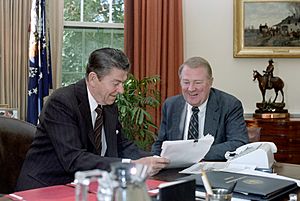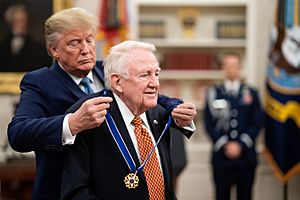Edwin Meese facts for kids
Quick facts for kids
Edwin Meese
|
|
|---|---|
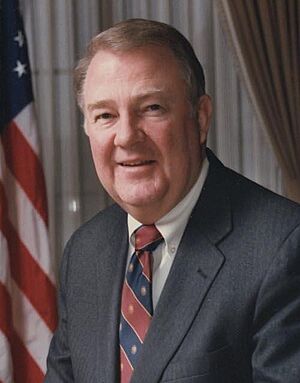
Official portrait, c. 1986
|
|
| 75th United States Attorney General | |
| In office February 25, 1985 – August 12, 1988 |
|
| President | Ronald Reagan |
| Preceded by | William French Smith |
| Succeeded by | Dick Thornburgh |
| Counselor to the President | |
| In office January 20, 1981 – February 25, 1985 |
|
| President | Ronald Reagan |
| Preceded by | Robert T. Hartmann John Otho Marsh Jr. (1977) |
| Succeeded by | Clayton Yeutter (1992) |
| Executive Assistant & Chief of Staff to the Governor of California | |
| In office 1969–1974 |
|
| Governor | Ronald Reagan |
| Personal details | |
| Born |
Edwin Meese III
December 2, 1931 Oakland, California, U.S. |
| Political party | Republican |
| Spouse |
Ursula Herrick
(m. 1959) |
| Children | 3 |
| Education | Yale University (BA) University of California, Berkeley (LLB) |
| Awards | Presidential Medal of Freedom (2019) |
| Military service | |
| Branch/service | United States Army |
| Years of service | 1953–1984 |
| Rank | Colonel |
| Unit | Field Artillery |
Edwin Meese III (born December 2, 1931) is an American lawyer, professor, and author. He is a member of the Republican Party. Meese was a close advisor to President Ronald Reagan. He worked for Reagan when Reagan was the governor of California and later in the White House.
Meese served as Counselor to the President from 1981 to 1985. He then became the 75th United States Attorney General, serving from 1985 to 1988. The Attorney General is the top lawyer for the U.S. government. After leaving government, Meese has worked with organizations like The Heritage Foundation and the Hoover Institution.
Contents
Early Life and Schooling
Edwin Meese III was born in Oakland, California, on December 2, 1931. He was the oldest of four sons. His father was an official in the city government of Oakland.
When he was only 10 years old, Meese and his brothers started their own neighborhood newspaper. They used the money they earned to buy a war bond to support the country during World War II. In high school, Meese was a top student and led his debate team to state championships.
Meese attended Yale University on a scholarship. At Yale, he was very active in student groups, including the Yale Political Union and the Yale Debate Association. He graduated with a degree in political science in 1953.
Military Service
While at Yale, Meese was part of the ROTC. After graduating, he joined the U.S. Army as a Second Lieutenant. He served on active duty for two years at Fort Sill in Oklahoma.
After his active service, Meese stayed in the U.S. Army Reserve, where he focused on military intelligence. He retired from the Army Reserve as a colonel in 1984 after many years of service.
Career in Law and Politics
After his military service, Meese went back to California to study law. He earned a law degree from the UC Berkeley School of Law in 1958. He then started working as a lawyer in the district attorney's office in Alameda County, California. He handled serious criminal cases and also had his own private law practice.
Working in California
In 1967, Meese began working for Ronald Reagan, who was the governor of California at the time. He started as a legal affairs secretary. By 1969, he became Reagan's executive assistant and chief of staff, which meant he was one of the governor's most important advisors.
Meese was known for being good at explaining complicated subjects to Reagan. He and another advisor, Mike Deaver, became a team that worked with Reagan for many years.
Berkeley Protests
During the late 1960s, there were many student protests at the University of California, Berkeley. One of the most famous was the People's Park protest in 1969.
As Reagan's chief of staff, Meese played a key role in the government's response to the protests. He advised Governor Reagan to declare a state of emergency. This led to National Guard troops being sent to the area. This decision was controversial, with some people supporting it and others criticizing it.
Working for President Reagan
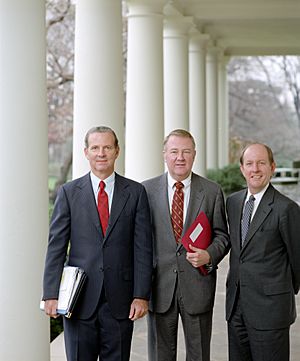
When Ronald Reagan ran for president in 1980, Meese was his chief of staff for the campaign. After Reagan won the election, Meese helped lead the team that prepared for Reagan to take office.
Counselor to the President
From 1981 to 1985, Meese served as Counselor to the President. This made him one of President Reagan's most trusted advisors. He was a member of the President's Cabinet and the National Security Council.
Along with James Baker and Michael Deaver, Meese was part of a powerful group of advisors often called "The Troika." He was known for being very influential in the White House. Journalist David Gergen said Meese was "almost an alter ego of Ronald Reagan" because he knew the president so well.
In 1983, Meese made comments about hunger in America that caused a lot of disagreement. He said he had not seen official proof that children were going hungry and suggested some people went to soup kitchens because the food was free. Many people criticized his remarks.
Attorney General
In 1985, President Reagan appointed Meese to be the United States Attorney General. The Attorney General is the head of the Department of Justice and acts as the main lawyer for the U.S. government.
As Attorney General, Meese was known for his conservative views on the law. He gave a famous speech calling for judges to follow the "original intent" of the writers of the U.S. Constitution. This idea sparked a debate with Supreme Court Justices like William J. Brennan and John Paul Stevens.
Meese also led the National Drug Policy Board, which worked with First Lady Nancy Reagan's "Just Say No" anti-drug campaign.
Investigations and Resignation
During the mid-1980s, some of Meese's actions and financial dealings were investigated. One investigation was related to his help for the Bechtel Corporation, which was trying to build an oil pipeline in Iraq.
Another investigation, known as the Wedtech case, looked into whether Meese had used his position to help a company that his friend worked for. A special prosecutor investigated these matters.
The prosecutor did not charge Meese with any crimes but was critical of his actions. Because of the controversy from these investigations, Meese resigned as Attorney General in 1988. President Reagan continued to support him, saying, "If Ed Meese is not a good man, there are no good men."
Later Life and Honors
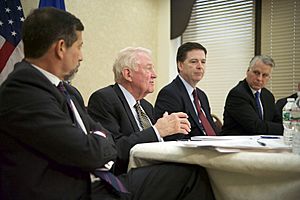
After leaving the White House, Meese joined The Heritage Foundation, a conservative think tank. He holds the Ronald Reagan Chair in Public Policy and is chairman of its Center for Legal and Judicial Studies.
In 2006, Meese was part of the Iraq Study Group, a team created to study the Iraq War and give advice on what to do next.
Meese has received many honors for his work. He is a fellow of the National Academy of Public Administration. He has served on the boards of many organizations, including George Mason University and the Junior State of America.
In 2019, President Donald Trump awarded Meese the Presidential Medal of Freedom. This is the highest honor a civilian can receive in the United States.
Books
Meese has written or co-written several books, including:
- With Reagan: The Inside Story (1992)
- The Heritage Guide to the Constitution (2005)
- Leadership, Ethics and Policing: Challenges for the 21st Century (2004)
See also
- Citizens for the Republic


